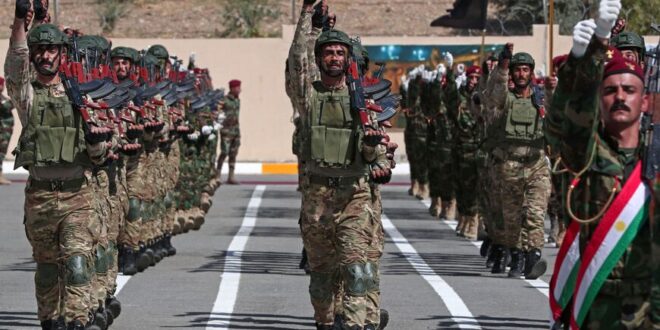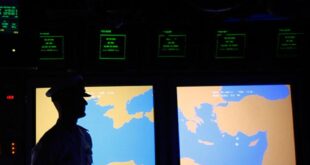The renewed agreement entails further steps to reform peshmerga forces as Pentagon aims to prepare Iraq’s forces for long-term self-sufficiency.
The United States renewed its agreement with Iraq’s Kurdistan Regional Government (KRG) on Wednesday to continue providing security support in the wake of the war against the Islamic State (IS).
The Pentagon’s top official for international security affairs, Celeste Wallander, and Kurdistan Region’s Minister of Peshmerga Affairs Shoresh Ismail Abdullah inked a four-year extension to the original 2016 memorandum during a ceremony in Erbil.
President Nechirvan Barzani and Prime Minister Masrour Barzani presided over the signing, which followed a meeting between Wallander and Iraq’s Defense Minister Jouma Anad in Baghdad.
The memorandum, which has not been made public, codifies specific guidelines on furthering institutional reform within the Kurdish peshmerga forces as well as steps for Erbil to continue bringing partisan peshmerga units under its unified command, US and Iraqi Kurdish officials told Al-Monitor.
Its signing shows the United States’ “commitment to supporting the peshmerga forces’ contributions to defeat-ISIS operations as a component of the Iraqi Security Forces,” read a joint statement.
The updated agreement “outlines progress achieved on critical institutional reforms and the Ministry of Peshmerga Affairs’ commitment to undertake additional reforms to advance the professionalization of its forces,” the statement read.
Why it matters: With IS territorially defeated, the Pentagon is aiming to prepare Iraq’s security forces for long-term self-sufficiency so that the jihadist group cannot return.
American officials see stability in Iraq’s Kurdistan Region as key to that goal, but budget shortfalls and lingering divisions between Baghdad and Erbil mean the US-led coalition continues to pay peshmerga salaries to the tune of $20 million per month a full two years after the United States reduced its military footprint and shifted to a command advisory role in Iraq.
The disconnect between Baghdad’s forces and the Kurdish peshmerga has also left space for surviving IS networks to continue to hide out in rural areas disputed between the two administrations.
The Peshmerga Ministry and Iraq’s Joint Operations Command began partnered missions against IS cells along the coordination line last year, but the inability of politicians in Baghdad to form a government has delayed plans to establish joint peshmerga-ISF brigades.
Significant divisions within the Kurdistan Region’s forces remain as well. The large majority of peshmerga units are aligned with either of the two dominant political parties, the Kurdistan Democratic Party (KDP) or the Patriotic Union of Kurdistan (PUK).
Washington has sought to disincentivize the factionalism by only funding and equipping nonpartisan peshmerga units that fall under the command of the ministry in Erbil.
The end goal remains full unification. The ministry has made steady progress incorporating KDP and PUK units over the past several months, but there is much to be done.
The US-led coalition reported earlier this year that the ministry’s nonpartisan Regional Guard Brigades (RGBs) boasted some 47,500 peshmerga members, while 40,000 to 45,000 remain associated with the KDP and 63,000 to 68,000 with the PUK.
“There’s been a lot of work under MAG-North on the regional guard brigades, which are ending the partisan peshmerga brigades, bringing them under the Ministry of Peshmerga and taking certain reform steps,” Dana Stroul, the Pentagon’s top Middle East policy official, told Al-Monitor.
“We agreed on certain steps within the reform agenda in a manner that’s both sustainable and provides steps that are responsive to congressional concerns,” Stroul said. “We’re going to fund and support regional brigades so that the peshmerga will be an even more combat-credible force.”
The United States, along with the UK, Netherlands, Germany and France have also pressed the Peshmerga Ministry for internal reform, including on retirement packages for officers and how it distributes salaries. Several Regional Guard Brigades transitioned this year from cash to electronic payments in an effort to eliminate grift, a Pentagon inspector general report noted in April.
“No doubt this memorandum was signed because there’s been progress made in the reforms,” US Army Col. Myles Caggins III, former spokesman of the US-led coalition, told Al-Monitor.
“The KRG continues to take on key reforms to modernize and professionalize the peshmerga forces, including by improving human resource management and increasing financial transparency,” US Air Force Lt. Col. Phil Ventura told Al-Monitor via email.
“The updated MOU codifies the need for continued progress in these areas and DoD’s support thereof,” Ventura wrote, noting that the agreement “does not obligate any new security commitments for the United States.”
What’s next: The ministry’s deputy director-general, Col. Farman Farhad, said last month that so far 20 peshmerga brigades had been brought under its command, with the remaining partisan units expected to be incorporated by the end of 2023.
That timeline is more optimistic than the one anticipated by American officials, as yesterday’s four-year agreement demonstrates.
In a report to the Pentagon’s inspector general in June, US Central Command assessed the Regional Guard Brigades “likely will remain somewhat influenced by partisan loyalties and political ties” despite formal affiliation with the Peshmerga Ministry.
CENTCOM called it “unlikely” that the Kurdish security forces “will completely unify as a nonpartisan force due to long-term distrust and unwillingness to relinquish control of party-affiliated security forces.”
Know more: Baghdad’s inability to bring the various Iraqi forces under its control has led to a tacit alliance between Kurdish PKK militants and a mysterious Iran-backed militia calling itself Ahrar Sinjar.
 Eurasia Press & News
Eurasia Press & News




